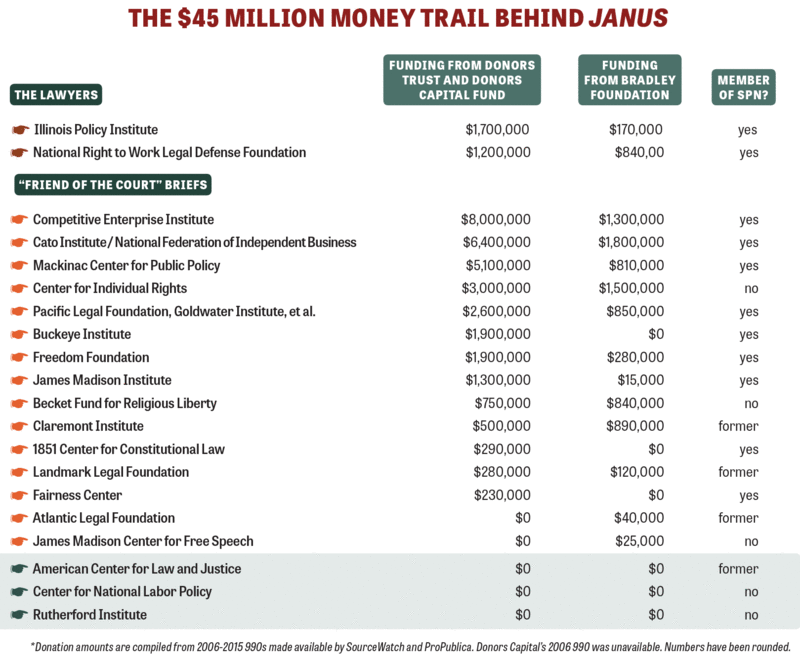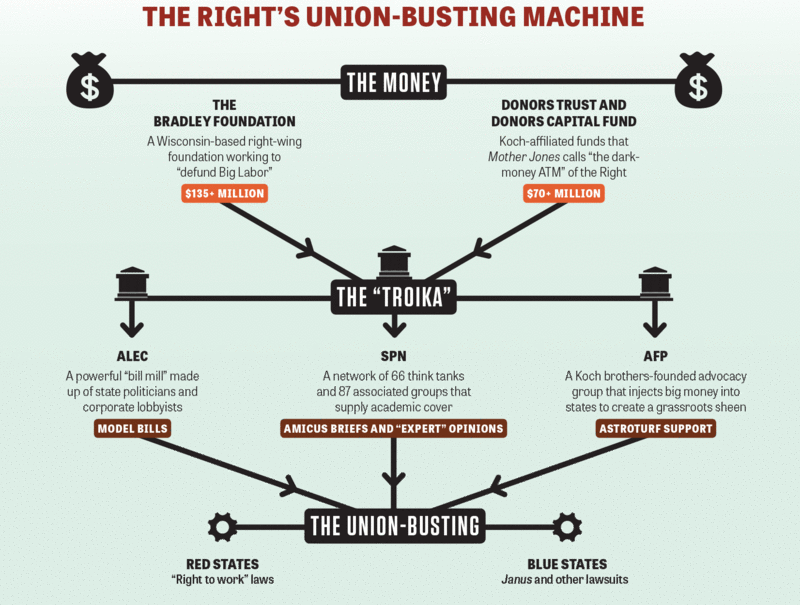Janus vs. AFSCME, U.S. Supreme Court Case
Janus vs. AFCME Council 31 was argued before the U. Supreme Court on February 26, 2018.[1] Mark Janus is a child support worker for the State of Illinois who does not want to pay the agency fees (also known as fair share fees) required to compensate the union representing Illinois state workers for the cost of his representation. This case is part and parcel of a coordinated legislative and legal strategy to dismantle unions being advanced in a systematic manner by an interlocking group of right-wing funders and state-based groups.
Mary Bottari of the Center for Media and Democracy wrote a major piece for the magazine In These Times (ITT) on the nexus between the American Legislative Exchange Council, the State Policy Network and Koch-tied funding groups and other funders that have systematically launched a legislative and legal attack on unions in states across the nation. In March 2018, Bottari won national recognition for the ITT article “Behind Janus: Documents Reveal Multi-Decade Plot to Kill Public Sector Unions." The award by the Sidney Hillman Foundation is for journalism in pursuit of the common good.
Bottari documents that the long list of amicus briefs filed on behalf of Janus are largely from State Policy Network groups that also organize "rallies" on the courthouse steps for the union-busting cases they have been advancing. "A long list of amicus curiae briefs from a variety of think tanks may make it seem as if the Janus side has broad national support. In fact, 13 of 19 briefs filed by organizations (rather than governments or individuals) for the plaintiff come from current or former members of SPN. Seventeen were filed by groups that have received funding from Bradley, Donors Capital and Donors Trust," reports Bottari. See In These Times graphic below.
Contents
Origins of Janus
The case did not originate with Mark Janus, but with billionaire venture capitalist and Illinois Governor Bruce Rauner.
On the campaign trail, Rauner promised a Reaganesque showdown with the state’s public workers. Just weeks after being sworn-in in January 2015, Rauner blamed the state’s significant financial woes on public-sector unions, called for union membership to be voluntary, for the introduction of local level “right to work” ordinances, and for a repeal of prevailing wage laws that boost wages for construction workers. (Misnamed “right to work” laws allow workers in the private sector to free ride, leading to weaker unions and lower wages.)
Faced with a defiant Democratic legislature, Rauner acted unilaterally issuing an Executive Order[2] blaming budget deficits on public workers and fair share fees and directing Illinois to stop withholding and passing on the fees to unions. (Later before a friendly crowd at the Hoover Institute Rauner would admit his proposal had “nothing to dow with the budget.”)[3]
Rauner knew the unions would fight back in court, so he also filed a federal lawsuit, Rauner v. AFSCME, seeking to have his decision declared legal and hoping to move the issue rapidly to the friendly venue of the U.S. Supreme Court. Because the federal court found he did not have standing, a small group of effected workers were put forward as intervenors, including Mark Janus.
The panoply of ideas Rauner has thrown out there impacting unions did not originate in the Land of Lincoln. They can all be found in the library of union-busting bills housed at the American Legislative Exchange Council (ALEC). ALEC was founded in 1973 to bring together politicians and corporate lobbyists to write and vote upon “model” state bills behind closed doors. The group is funded by Koch Industries as well as big tobacco, PhRMA and other fossil fuel companies. In 2010, ALEC bills, exploded out of state legislatures when Republicans were swept in to office, after the devastating 2008 financial crisis. In red state, ALEC along with it sister group the State Policy Network (SPN) and the Kochs’ astroturf operation Americans for Prosperity pursued ALEC “right to work” bills. In blue states, they pursued other tactics including anti-union lawsuits.
Janus Lawyers, IPI Funding Scandal Exposed by Chicago Sun Times
Rauner’s original lawsuit was advanced by the Illinois Policy Institute’s Liberty Justice Center. IPI is a $7 million member of both ALEC and SPN. IPI has also been funded by the Donors Capital and Donors Trust the preferred investment vehicle of the Koch network of funders. It has also been funded by family foundations of billionaire Richard Uihlein, and Rebekah Mercer. Plus, Rauner himself gave IPI $500,000 and poached some of its top staff in the early days of his administration. [4] Recently the Chicago Sun-Times called for a criminal investigation of the group for mixing for-profit and not-for-profit activities. Learn more on the Illinois Policy Institute Sourcewatch page. [5][6]
The National Right to Work Legal Defense Foundation supplied the lawyers for most of the anti-union cases before the U.S. Supreme Court and they are now the lead attorney’s in the Janus case. The group was founded in 1968 and has a mission to "eliminate coercive union power.” The 501 C3 litigation group combined with its 501 C4 lobbying arm is a $15 million powerhouse, according to recently available IRS 990s. A member of the SPN network, it receives funding from the Koch-tied Donor’s Trust/Donors Capital investment vehicles and two of the biggest foundations working to privatize the public education system, the Bradley Foundation and the Walton Foundation. Learn more on the National Right to Work Legal Defense Foundation Sourcewatch page.
Janus Amici Briefs, State Policy Network Anti-Union Campaigns and Toolkits
The vast majority of groups filing amici brief in this case are members of the State Policy Network, a network of 66 state-based “think tanks” and 87 associated right-wing groups. You can access the SPN members list here.
The Center for Media and Democracy, publishers of Sourcewatch, gave documents to the Guardian in 2016 which pulled back the curtain on SPN’s anti-union drive. The Guardian article entitled “Rightwing alliance plots assault to 'defund and defang' America's unions” can be accessed here. [7]
State Policy Network fundraising letter for concentrated campaign to dismantle government unions can be accessed here.
State Policy Network tool kit for dismantling unions can be accessed here.
The SPN tool kit, entitled “State Workplace Freedom” “equips policymakers with the tools they need to turn the tide of undue union power in their states,” the toolkit says. SPN has done extensive polling and instructs legislators how to talk about the bills. Rule Number 1: “Be pro worker not anti-union…Don’t rant against unions.. using phrases like ‘union fat cats’ and ‘corrupt union bosses’ and other negative language reduces support for reform.”
The toolkit proposes four bills to dismantle unions in the states:
- “Worker voting rights” -- a poison pill requirement from Wisconsin, which forced unions and only unions to have an annual vote to rectify under extremely different voting conditions. Unions must turn out 50 percent of their bargaining unit and get a vote for 50 plus one, a bar no politician has ever met for an election.
- Harris v. Quinn opt out campaigns --a door to door tactic emerging from Washington state’s “Freedom Foundation” to convince quasi-public sector home health care workers to drop their union. The toolkit highlights an $8 million reduction in union funds in Washington state.
- “Right to Work”—the cookie-cutter ALEC model bill that weakens unions by allowing free riders. ALEC also promotes a version of the bill for localities.
- “Worker Choice” –would weaken collective bargaining by allowing workers represent themselves individually before employers.
The SPN fundraising letter and tool kit make clear that SPN network has no little interest in the rights of workers but a great deal of interest in defunding unions and making them powerless to compete in campaigns and elections.
Funding for National Anti-Union Efforts
Key funding sources for the primary groups pursuing a national anti-union agenda include the Donors Trust and Donors Capital Fund, the funding vehicles used by the Koch Network of funders to mask their identities. DonorsTrust and Donors Capital Fund Grant Recipients can be accessed here.
The Milwaukee-based Lynde and Harry Bradley Foundation has given $133 million to SPN member groups since the 1980s the Center for Media and Democracy has estimated . Contributions of the Bradley Foundation can be accessed here.
CMD’s series on the Bradley Foundation’s details the Foundations attack on unions in three parts:
- “Bradley Foundation Bankrolls Attacks on Unions” by Mary Bottari.
CMD has long tracked Richard Berman’s PR firm Berman & Company and the scores of front groups generated by the firm. Berman’s specializes in anti-union attacks through his front group Center for Union Facts. Previously CMD obtained a tape of Berman’s anti-union tactics in a 2014 investigation “Rick Berman Exposed in New Audio; Hear His Tactics against Environmentalists and Workers Rights.” Berman boasted about his obsession with unions and his attack on their efforts to raise the minimum wage for American workers: "I get up every morning and I try and figure out how to screw with the labor unions." Listen to this clip here.
Quotes Revealing Real Motivations of SPN Groups and Funders
Excerpt from the article the The Two Faces of Janus, published by In These Times February 2018:
BEHIND CLOSED DOORS
It would be imprudent for Bradley or SPN to be as blunt as Norquist in public (given their tax-exempt status as charitable organizations), but internal Bradley and SPN documents are clear about their goal of bleeding the Democratic Party of funding.
Norquist has long described unions, public-sector workers and trial lawyers as the funding “pillars” of the Democratic Party. In internal documents prepared for its board of directors, Bradley staff channels Norquist and recommends continued funding for the NRTDLF because “big Labor and trial attorneys … are the two principal funding pillars of the Left.” Bradley has gifted the anti-affirmative action Center for Individual Rights, which represented the Friedrichs plaintiffs, with more than $1.5 million.
Materials prepared for the Bradley board track Friedrichs and the cases leading up to it. A map from the pro-worker Economic Policy Institute is included to show states that allow fair share fees, annotated to show the potential monetary losses for unions at $500 million to $1 billion per year. Bradley staff quote “the leftist In These Times,” which characterized Friedrichs as a case “that could decimate public-sector unions.”
Another case leading up to Janus was Bain v. California Teachers Association, which attacked the way the union processed political fees. Bradley staff called Bain and Friedrichs combined a “powerful ‘one-two’ punch” against unions, predicting that “all that would remain to fund the unions’ political apparatus would be the hardcore teacher members.”
For Bradley, the anti-union work was a twofer. Bradley has long been a proponent of the privatization of America’s schools; America’s public school teachers and powerful teachers unions stand in the way. Internal documents show Bradley staff bluntly advocating projects to “defund teachers unions and achieve real education reform” at the same time.
“Teachers unions are at the heart of all this,” says Harvard’s Theda Skocpol. “Teachers exist in every community across the country. They are educated, they speak up, and they care about public schools. Break the teachers unions and you break the organizational power that exists in and around the Democratic Party at the state and local level.”
In an April 2016 fundraising letter obtained by the Center for Media and Democracy and published in the Guardian, SPN CEO Tracie Sharpe asks her readers to help strike “a major blow to the Left’s ability to control government.”
I am writing you today to share with you our bold plans to permanently break the power of unions this year. ... I am talking about the kind of dramatic reforms we’ve seen in recent years in Indiana, Wisconsin, Michigan and now West Virginia—freeing teachers and other government workers from coercive unionism—and spreading them across the nation. … I’m talking about permanently depriving the Left from access to millions of dollars in dues extracted from unwilling union members every election cycle.
SPN’s secret union-busting toolkit even celebrates this February 2016 quote from a Wisconsin AFSCME leader talking about the devastating impact of Walker’s Act 10 bill: “Do we have less boots on the ground? Yeah. Do we give the same amount of money to candidates? No.”
The Freedom Foundation in Olympia, Wash.—a featured and feted SPN member—has been equally explicit in its fundraising letters. One 2014 letter obtained by the Guardian reads, “The Freedom Foundation has a proven plan for bankrupting and defeating government unions through education, litigation, legislation and community activation.”
A Freedom Foundation-produced brochure, titled “Undue Influence: Public Unions’ Cycle of Power, Electioneering,” shows multiple charts and graphs on union spending in campaigns and elections. The graph “Democrats’ Dependence on Union Funds” lists 31 Washington state Democratic legislators and their union campaign contributions. The accompanying text argues that “the problem associated with union electioneering” could be solved by weakening unions and eliminating fair share fees.
SPN member groups have also cited their union-busting efforts as key to electing Trump. The Wall Street Journal profiled Tracie Sharpe in a post-election puff piece on its editorial page, titled “The Spoils of the Republican State Conquest.” She tells the paper that Wisconsin and Michigan were only “thinly blue” and that the destruction of the states’ unions has put the GOP on better footing. “When you chip away at one of the power sources, that also does a lot of get-out-the-vote,” Sharpe chirped. “I think that helps—for sure.”
Unions lost 136,000 members in Wisconsin; Trump won by 23,000 votes. “Did the labor reforms enacted in Wisconsin and neighboring Michigan help Donald Trump win those states?” asks Norquist associate Matt Patterson in the Daily Signal. “No question in my mind. Hard to fight when your bazooka’s been replaced by a squirt gun.”
Most of the groups pursuing this agenda, including Bradley and SPN, are tax-exempt charitable groups. After Citizens United ushered in a surge of dark money groups, the Obama administration’s IRS attempted to distinguish real charitable organizations from false ones, only to have the effort shut down by tremendous blowback from the Right. Ever since, the IRS has been reluctant to take action on these kinds of issues.
“There is simply no basis in law to find that defunding or attacking unions is a tax-exempt charitable activity,” says attorney Marcus Owen, former director of the IRS’s exempt organizations division. “On the contrary, such actions are deeply infused with private benefit to employer interests and political party interests—but not with community or public benefit, which is required under the law.”
Resources
References
- ↑ SCOTUS Blog, [1] Accessed February 15, 2018.
- ↑ Illinois.gov, [2] Accessed February 15, 2018.
- ↑ Hoover Institution, [3] Accessed February 15, 2018.
- ↑ Bernard Schoenburg, Bernard Schoenburg: Illinois Policy Institute got half million from Rauner, The State Journal-Register, November 7, 2013.
- ↑ Mick Dumke and Tina Sfondeles, Small-government think tank yields big bucks for nonprofit’s leaders, Chicago Sun Times, February 11, 2018.
- ↑ Editorial: Illinois Policy Institute nonprofit tax status begs for FBI probe, Chicago Sun Times, February 12, 2018.
- ↑ Ed Pilkington, Rightwing alliance plots assault to 'defund and defang' America's unions, The Guardian, August 30, 2017.


